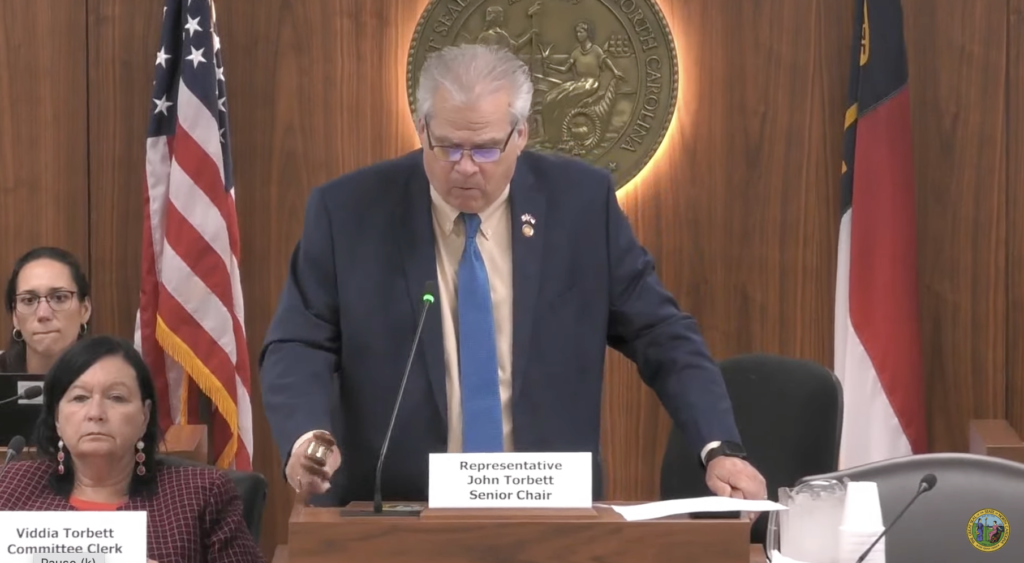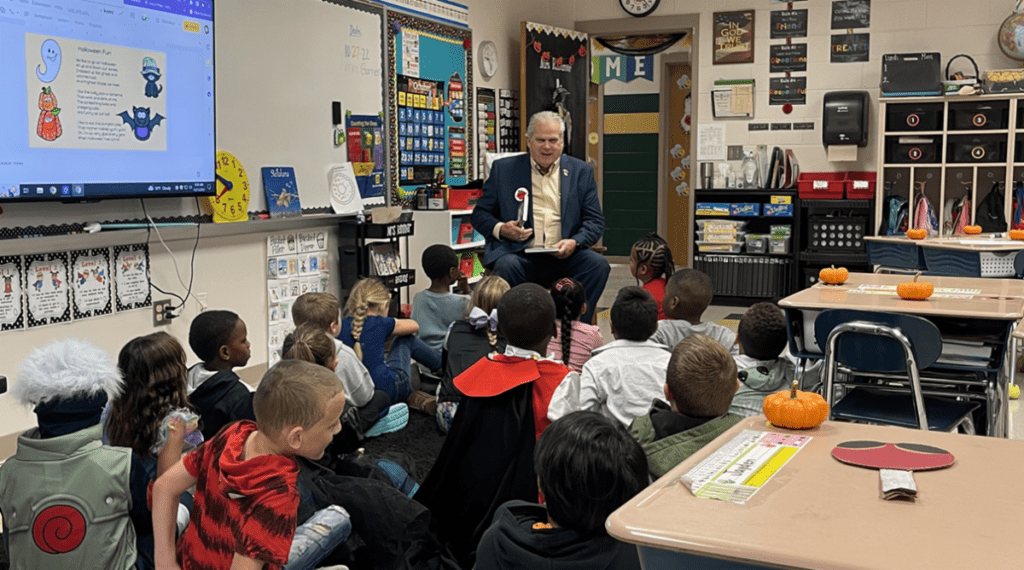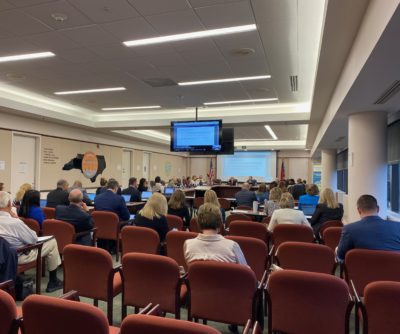

|
|
Rep. John Torbett, R-Gaston, sometimes speaks off the cuff. Nowhere was this on better display than at a meeting of the House Select Committee on an Education System for North Carolina’s Future in May. In that meeting, he proposed replacing principals with so-called “executive teachers.” Some critics interpreted his comments to mean that he wanted to get rid of principals.
During a recent interview, Torbett thought back to that moment.
“I said it one time at one meeting early on that we don’t need principals,” he said. “Well, I didn’t mean it the way it came out, but I did say that so I’ll take the responsibility.”
EducationNC sat down with Torbett recently to take a deeper look at the areas of education he hopes to see reformed.
These are thoughts he’s developed in the past year as the select committee began re-imagining education in the state from the ground up. It has so far met 13 times, often in the General Assembly building in downtown Raleigh, but also on the road in places such as Gaston, Randolph, and Mecklenburg counties.
Torbett’s background
Torbett is from Tennessee, where he graduated from East Ridge High School in 1974 and Middle Tennessee State University in 1977.
According to his website, he started his career building single-family homes and commercial properties in the 1970s, and then going on to work in the corrugated converting industry in Tennessee, Arkansas, North Carolina, and elsewhere.
In the 2000s, he went on to work in business development for a U.S. Department of Defense Contractor, “specializing in Command and Control Software Development for Unmanned Air, Ground, Sea and Sub Surface Systems, and Equipment Life Extension of avionic and weapon systems.” He moved to a similar position at NextWave Technologies in Cary in 2010.
His political career began in the early 2000s when he jumped in the fray to become a Gaston County commissioner, a role he won in 2002. He continued to serve until 2010, when he ran for the North Carolina General Assembly. He has continued to serve ever since and left his corporate position to focus on his legislative work.
He has done a lot of work on transportation, chairing both the transportation and transportation appropriations committees, among many other leadership positions. You can see all the committees he’s worked on, chaired, and other public service roles he’s held on his website.
Why education?
Torbett’s interest in education started where it does for so many: with his own children.
He had a daughter who attended public schools, and he was president of the Parent Teacher Organization (PTO) of almost every school she attended.
But when his daughter — now 38 — was in elementary school, Torbett went to the principal of the school and asked what he could do to help. The principal asked him to raise $6,000 for copy paper. Torbett asked why.
“He said, ‘Well we don’t get enough allocation from central office, so the teachers have to pay for it out of pocket. So we’d like to have PTO raise money to have the necessary copy paper,'” Torbett remembers the principal saying.
Torbett told the principal he’d rather go to the central office and tell them to shell out the cash. He was more interested in “pushing the envelope.” In this case, that meant bringing a computer lab to the school. If he did that, it would be the first computer lab in a Gaston County school.
But the principal said that the community there wasn’t well-off enough to afford that. Torbett asked the principal to let him give it a shot anyway.
“So literally in about six weeks, the good parents of that area of the Stanley community raised over $22,000, and we had the first computer lab in elementary school in Gaston County. Simply because that was our push,” he said. “That was pushing the envelope.”
The origins of the futures committee
Torbett’s current leadership role in education came when House Speaker Tim Moore, R-Cleveland, tapped him to take on the responsibility for chairing the House education and education appropriations committees. Torbett said Moore reminded him that this would mean directing a budget in excess of $15 billion, compared to the roughly $5 billion the Department of Transportation deals with.
Torbett said he felt like he was “drinking from a firehose,” so he decided to take a deep dive on education.
“After several months, I went to the speaker. I said to him, I honestly think that the fix that we need is to get back to just the basics of educating children as the primary focus,” Torbett said. “That’s it. That’s the job. That’s the task. If nothing else happens, educate each and every child in that classroom.”
But he said he doesn’t believe that can be done within the current system.
“I think it would honestly be easier just to create a new system from the ground up with all the technology we have we can bring to bear, and look forward for 100 years,” he said.
So he created the House Select Committee on an Education System for North Carolina’s Future to do just that.


‘Structural piers’
As the committee has met and traveled around the state, Torbett said he has been looking to identify the foundational items needed for a strong education system in the state. The “structural piers,” as he calls them.
He identified five during an interview with EducationNC, though in many cases he said they are all interconnected. The most pressing, he said, was what many critics of the General Assembly have been calling for repeatedly since the Republicans took the reins of the legislature in 2011: teacher compensation.
“First and foremost — always first and foremost — we have to adjust teacher compensation,” he said. “We have to make it so they are paid at the professional level they have been educated to be.”
The General Assembly has provided regular salary increases to teachers over the years, but some have criticized both the amount and distribution of those raises.
In the most recent session of the General Assembly, lawmakers added on to the 2.5% average raises passed for the 2021-22 fiscal year with an average 4.2% increase for 2022-23. But that’s not across the board. Some teachers will get bigger raises than others.
That ties into another one of Torbett’s structural piers: advanced teaching roles. These are leadership roles that teachers can take on rather than going into administration, the route that many educators looking to advance take. Torbett said he wants to avoid the brain drain out of the classroom into the central office.
“I’ve talked to principals, and I’ve talked to administrators. What they would love to do, why they went in there, is to teach, but because the compensation isn’t equated in administrative as it is with teachers, it isn’t equal,” he said. “Then they feel like to adjust compensation, to send their kids to college, to be able to afford another car, to do those things that families have to do as you age within a system, they have to jump into administration to earn that extra dollar.”
When it comes to what students actually learn in the classroom, Torbett said he feels like the education system needs to get back to “core curriculum,” another one of his structural piers.


He said the teacher’s time in the classroom needs to focus on the basics, things like math, science, English, history. He even considers courses such as the performing arts essential. But some others subjects — electives such as Spanish, he said — could perhaps be moved mostly online.
As part of that structural pier, Torbett also said he would like to see the calendar year go back to being marked by Labor Day and Memorial Day as the start and end dates.
Districts have been pushing lawmakers for years to let them have calendar flexibility: basically the ability to choose their own calendars rather than the one mandated by the legislature. The state says that students must be in school for a minimum of 185 days a year or 1,025 hours of instruction. It also says that schools can’t start earlier than the Monday closest to Aug. 26, and they can’t end later than the Friday closest to June 11.
Hopefully, by moving some classes online and focusing on core subjects in class, schools wouldn’t find themselves pressed for time and thus in need of a different calendar year, Torbett said.
“I’m thinking we’ve been fighting this battle for well over two decades now,” he said of calendar flexibility, indicating he thinks it’s time to be done with the debate.
Another long-standing issue that Torbett wants to tackle is the testing apparatus surrounding the state’s public schools.
The End-Of Grade and End-of-Course tests taken by many North Carolina students are used both for grades and also for evaluating how well schools are doing around the state. School Performance Grades are overwhelmingly weighted toward proficiency, a metric determined in large part by these tests.
“So we’re expecting a child to be the best they possibly can be on one given day over a certain amount of hours. And it’s you get it or you don’t,” he said. “And that’s the grade, and that grade is a basis for other things. That is the most terrible system I’ve ever heard of in my life.”
That brings Torbett to another one of his structural piers. It doesn’t really have a concise word that defines it, but essentially Torbett wants to use data to reform the way students are evaluated and move through school.
He wants to de-emphasize testing and instead use a more competency-based approach that could measure a student’s performance throughout the year in real time and give a cumulative grade at the end. This would also enable students to advance if they are performing above grade-level.
“As an old school guy, kind of like your equalizer on your old stereo system where you would see the bars go up and you want to do your treble and your bass to kind of get the sound that you’re looking for,” he said. “This would give this information to a teacher so a teacher could, at moment’s notice, at real time, go and see where each child in the classroom is currently on the subject matter. And they can adjust their teaching talents and skills to effectively address the ones that need to be pulled up to the level where maybe other ones are in the classroom.”
The final “structural pier” Torbett discussed relates to school discipline.
He said the education system is doing a disservice to students who cause a disruption by not getting them the help they need to deal with the root cause of the behavior. And at the same time, he said it’s unfair to other students when one child disrupts the learning taking place in the classroom.
“So we need to take a disruptive child out of that system so we can let the other kids continue on with their education course, and then figure out what’s triggering this individual and move it to the point where we help this individual get back into the classroom,” he said. “But we can’t just turn a blind eye or act like it’s not going on.”
Critics of the the current state of school discipline point to the way students of color seem to be disproportionately punished when compared to some of their peers.
“The constitution places educating each and every child in North Carolina at the feet of the North Carolina General Assembly,” he said, “and it’s high time we pick that responsibility up and make sure we do the best we can to educate each and every child in that classroom regardless.”
If punishments are handed out unfairly by teachers or other school leaders, Torbett said that would have to be remedied.
“If it shows signs of racial bias or or gender bias, then we have to address that, of course we do. I have no problem with that,” he said.
What now?
Torbett said the House Select Committee on an Education System for North Carolina’s Future will come out with a report ahead of the upcoming long session, but that it will likely not include any draft legislation. He said it is more of a “first round look” at what the committee has found.
He is hopeful the committee will continue after the long session and, if so, that would give Torbett the chance to “cement” the piers he’s working on and start building upon them “using people much smarter than me that are out there in the system to paint that next picture or to build that next education system.”
Torbett called education one of the “issues of our time” and said that it is incumbent upon lawmakers to address it. The ability of people to get a good education is paramount to their success in life, he said. Which brought him back to his original “structural pier” of teacher compensation.
“(People) can move mountains with a good solid education. And then to have a good solid education, you have to have that teacher in the classroom that’s helping that child reach whatever goal that child wants to reach,” he said. “And to do that, we have to compensate them adequately so they can also raise a family and send their kids to college — just like every one of us hoped for — and have a good earning level for their kids as well. And we just got to do better in education.”



